Monument of Martin Luther in Eisleben, the town of his birth and death (Getty Images)

500 years ago, Europe was in disarray. Deeply held ideological differences divided communities and nations, with those protesting against the status quo being vilified for threatening the statutes and social unity which held great nations together. Unless you could see a way to achieve something you previously hadn’t been allowed to do, in which case the protesters became your allies.
It was, of course, the Reformation.
Presenting a fundamental challenge to the core doctrines of the Church, Luther, Zwingli and others developed a theology which did not require ‘good works’ in order to receive salvation, but relied solely on faith in God. This turned out to be more than soteriological geekery, because it called into question many of the practices which had become common in religious life and which were seen as corrupt: paying for indulgences (fees paid to a priest in return for penance), for example.
And it ended up shifting political power bases. In England, Henry VIII saw an opportunity to use this religious and cultural shift to his advantage, adopting the new Protestant regime as the established church so that he could divorce and remarry. Quite a lot, as it turns out.
That’s the 90-second version, anyway. But of course the implications were far-reaching, and wars of religion between the Catholics (as the previously established church became known) and the newly formed Protestants ensued, followed by centuries of religious schism.
But is that over now?
The Pew Research Center recently surveyed people in Western Europe and the USA and found that the historical gap in theological position and social acceptance has narrowed dramatically. Not only are our beliefs becoming more similar these days – 46% of US Protestants say that faith in God and good works are needed to get into heaven, which has historically been the Catholic position – but our friendships and families are more accepting now. In Germany, where much of this all began, 98% of Protestants say they would accept Catholics as members of their family, 97% of Catholics say the same about Protestants.
So, if we see our religious landscape shifting over time, what might happen in the future?
‘None of the above’
The rise of the number of people in many developed nations ticking the No Religion category might suggest, as some argue, that religion will hold no value in the future of public life. Or, while it might indicate that people are not finding (or perhaps even looking for) a home in a formal religion, it could mean that people are choosing other ways to find spiritual comfort. We discussed this and other lessons from recent religion polling on this week’s Beyond Belief on BBC Radio 4. But it’s also worth noting that Pew Research projects that the ‘No Religion’ affiliations will decline as a share of the world’s population.
Family ties
While, in developed countries like Britain, the pull away from religious affiliation is stronger than the pull towards it, childhood is consistently found to be the optimum time for faith formation. Our recent ComRes research for the Church of England and HOPE Together found that people who identified as Christian in adulthood consistently attributed ‘becoming a Christian’ to early childhood. The habits of parents and carers today will directly influence the religious landscape of the next generation.
Immigration
Research in developed nations fairly consistently finds that many people who arrive legally from other countries bring religious observance with them. Studies in the US find that Christian immigrants are more Catholic, more Orthodox, and less Protestant than American Christians, and that those immigrants who are Protestant are more likely to be evangelical. In Britain, we can see from British Social Attitudes data that 81% of Hindus and 96% of Sikhs identify as being of Indian origin. Without immigration, the religious landscape in each of these countries might be more homogenous.
More Muslims
Global projections indicate that, broadly, by 2050 there will be around the same number of Muslims and Christians in the world (there are currently more Christians), which might be related to family size although there are competing arguments on this (see Hans Rosling’s TED talk below).
****
FURTHER READING
Measuring religious affiliation
For more on the fallout of the Reformation in England see Dr Clive Field, who specialises in studying the religious history of Britain. In this paper about religious affiliation and record-keeping he notes that ‘Uniformity legislation was introduced to enforce adherence to the Church of England, including compulsory attendance at parish churches, a provision which – amazingly – was on the statute books for almost the entire period 1552–1969.’
Hans Rosling on birth rates
In a spectacular take-down of the prevailing wisdom that religion is a primary determinant of family size, data guru Rosling correlates birth rate data with income levels and religious affiliation from 1960 to 2010 and draws some striking conclusions about education, poverty and fecundity.
Notable exception: Northern Ireland
The legacy of sectarian conflict lives on in Northern Ireland in a way which is arguably unique in Western Europe. While immense progress has been made, peace remains fragile and memories are long. Much has been written on this, and a good starting point is the work of academics Professor John Brewer and Dr Gladys Ganiel, both of Queens University Belfast.










Join the discussion
Join like minded readers that support our journalism by becoming a paid subscriber
To join the discussion in the comments, become a paid subscriber.
Join like minded readers that support our journalism, read unlimited articles and enjoy other subscriber-only benefits.
Subscribe